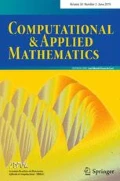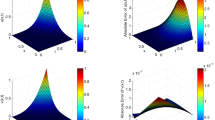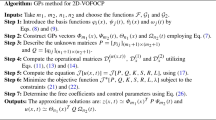Abstract
This paper addresses the application of generalized polynomials for solving nonlinear systems of fractional-order partial differential equations with initial conditions. First, the solutions are expanded by means of generalized polynomials through an operational matrix. The unknown free coefficients and control parameters of the expansion with generalized polynomials are evaluated by means of an optimization process relating the nonlinear systems of fractional-order partial differential equations with the initial conditions. Then, the Lagrange multipliers are adopted for converting the problem into a system of algebraic equations. The convergence of the proposed method is analyzed. Several prototype problems show the applicability of the algorithm. The approximations obtained by other techniques are also tested confirming the high accuracy and computational efficiency of the proposed approach.









Similar content being viewed by others
References
Ablinger J, Blümlein J, Marquard P, Rana N, Schneider C (2019) Automated solution of first order factorizable systems of differential equations in one variable. Nucl Phys B 939:253–291
Alliera CHD, Amster P (2018) Systems of delay differential equations: analysis of a model with feedback. Commun Nonlinear Sci Numer Simul 65:299–308
Avazzadeh Z, Hassani H (2019) Transcendental Bernstein series for solving reaction–diffusion equations with nonlocal boundary conditions through the optimization technique. Numer Methods Partial Differ Equ 35(6):2258–2274
Dahaghin MS, Hassani H (2017a) A new optimization method for a class of time fractional convection–diffusion-wave equations with variable coefficients. Eur Phys J Plus 132:130
Dahaghin MS, Hassani H (2017b) An optimization method based on the generalized polynomials for nonlinear variable-order time fractional diffusion-wave equation. Nonlinear Dyn 88(3):1587–1598
Farayola MF, Shafie S, Siam FM, Khan I (2020) Mathematical modeling of radiotherapy cancer treatment using Caputo fractional derivative. Comput Methods Prog Bio. https://doi.org/10.1016/j.cmpb.2019.105306
Farooq U, Khan H, Baleanu D, Arif M (2019) Numerical solutions of fractional delay differential equations using Chebyshev wavelet method. Comput Appl Math. https://doi.org/10.1007/s40314-019-0953-y
Feng TF, Chang CH, Chen JB, Zhang HB (2019) The system of partial differential equations for the \(c_0\) function. Nucl Phys B 940:130–189
Ganesan S, Lingeshwaran S (2017) Galerkin finite element method for cancer invasion mathematical model. Comput Math Appl 73(12):2603–2617
Gupta PK, Singh J, Rai KN (2010) Numerical simulation for heat transfer in tissues during thermal therapy. J Therm Biol 35:295–301
Gupta PK, Singh J, Rai KN, Rai SK (2013) Solution of the heat transfer problem in tissues during hyperthermia by finite difference-decomposition method. Appl Math Comput 219:6882–6892
Hassani H, Avazzadeh Z, Tenreiro Machado JA (2019) Solving two-dimensional variable-order fractional optimal control problems with transcendental Bernstein series. J Comput Nonlinear Dyn 14(6):11
Hassani H, Avazzadeh Z, Tenreiro Machado JA (2020) Numerical approach for solving variable-order space-time fractional telegraph equation using transcendental Bernstein series. Eng Comput 36:867–878
Hilfer R (2000) Applications of fractional calculus in physics. World Scientific, Singapore
Jaros J, Kusano T (2014) On strongly monotone solutions of a class of cyclic systems of nonlinear differential equations. J Math Anal Appl 417:996–1017
Kreyszig E (1978) Introductory functional analysis with applications. Wiley, Oxford
Kumar M, Upadhyay S, Rai KN (2018) A study of lung cancer using modified Legendre wavelet Galerking method. J Therm Biol 78:356–366
Liu J, Wang XS (2019) Numerical optimal control of a size-structured PDE model for metastatic cancer treatment. Math Biosci 314:28–42
Miller KS, Ross B (1993) An introduction to the fractional calculus and differential equations. Wiley, New York
Mohammadi V, Dehghan M (2020) Generalized moving least squares approximation for the solution of local and non-local models of cancer cell invasion of tissue under the effect of adhesion in one- and two-dimensional spaces. Comput Biol Med. https://doi.org/10.1016/j.compbiomed.2020.103803
Owolabi KM (2018) Mathematical analysis and numerical simulation of chaotic noninteger order differential systems with Riemann-Liouville derivative. Numer Methods Partial Differ Equ 34(1):274–295
Owolabi KM, Pindza E, Davison M (2018) Dynamical study of two predators and one prey system with fractional Fourier transform method. Numer Methods Partial Differ Equ 35(5):1614–1636
Podlubny I (1999) Fractional differential equations. Academic Press, New York
Rahimkhani P, Ordokhani Y (2020) The bivariate Müntz wavelets composite collocation method for solving space-time-fractional partial differential equations. Comput Appl Math. https://doi.org/10.1007/s40314-020-01141-7
Ravi Kanth ASV, Garg N (2020) A numerical approach for a class of time-fractional reaction–diffusion equation through exponential B-spline method. Comput Appl Math. https://doi.org/10.1007/s40314-019-1009-z
Riewe F (1997) Mechanics with fractional derivatives. Phys Rev E 55(3):3582–3592
Roohi R, Heydari MH, Aslami M, Mahmoudi MR (2018) A comprehensive numerical study of space-time fractional bioheat equation using fractional-order Legendre functions. Eur Phys J Plus 133:412
Sabermahani S, Ordokhani Y, Yousefi SA (2018) Numerical approach based on fractional-order Lagrange polynomials for solving a class of fractional differential equations. Comput Appl Math 37:3846–3868
Sabermahani S, Ordokhani Y, Yousefi SA (2020a) Fractional-order general Lagrange scaling functions and their applications. BIT Numer Math 60:101–128
Sabermahani S, Ordokhani Y, Yousefi SA (2020b) Fractional-order Fibonacci-hybrid functions approach for solving fractional delay differential equations. Eng Comput 36:795–806
Sabermahani S, Ordokhani Y, Yousefi SA (2020c) Two-dimensional Müntz–Legendre hybrid functions: theory and applications for solving fractional-order partial differential equations. Comput Appl Math. https://doi.org/10.1007/s40314-020-1137-5
Schittkowski K (1997) Parameter estimation in one-dimensional time-dependet partial differential equations. Optim Method Softw 7:165–210
Shangerganesh L, Nyamoradi N, Sathishkumar G, Karthikeyan S (2019) Finite-time blow-up of solutions to a cancer invasion mathematical model with haptotaxis effects. Comput Math Appl 77(8):2242–2254
Shekari Y, Tayebi A, Heydari MH (2019) A meshfree approach for solving 2D variable-order fractional nonlinear diffusion-wave equation. Comput Methods Appl Mech Engr 350:154–168
Yang X, Zhang H, Tang Q (2020) A spline collocation method for a fractional mobile-immobile equation with variable coefficients. Comput Appl Math. https://doi.org/10.1007/s40314-019-1013-3
Zhao F, Huang Q, Xie J, Li Y, Ma L, Wang J (2017) Chebyshev polynomials approach for numerically solving system of two-dimensional fractional PDEs and convergence analysis. Appl Math Comput 313:321–330
Zhao T, Mao Z, Karniadakis GE (2019) Multi-domain spectral collocation method for variable-order nonlinear fractional differential equations. Comput Methods Appl Mech Eng 348:377–395
Zhou Y, Casas E (2014) Fractional systems and optimization. Optimization 63(8):1153–1156
Zhou Y, Ionescu C, Tenreiro Machado JA (2015) Fractional dynamics and its applications. Nonlinear Dyn 80(4):1661–1664
Author information
Authors and Affiliations
Corresponding author
Additional information
Communicated by Agnieszka Malinowska.
Publisher's Note
Springer Nature remains neutral with regard to jurisdictional claims in published maps and institutional affiliations.
Rights and permissions
About this article
Cite this article
Hassani, H., Machado, J.A.T., Naraghirad, E. et al. Solving nonlinear systems of fractional-order partial differential equations using an optimization technique based on generalized polynomials. Comp. Appl. Math. 39, 300 (2020). https://doi.org/10.1007/s40314-020-01362-w
Received:
Revised:
Accepted:
Published:
DOI: https://doi.org/10.1007/s40314-020-01362-w
Keywords
- Nonlinear system of fractional-order partial differential equations
- Generalized polynomials
- Operational matrix
- Optimization problem
- Control parameters




